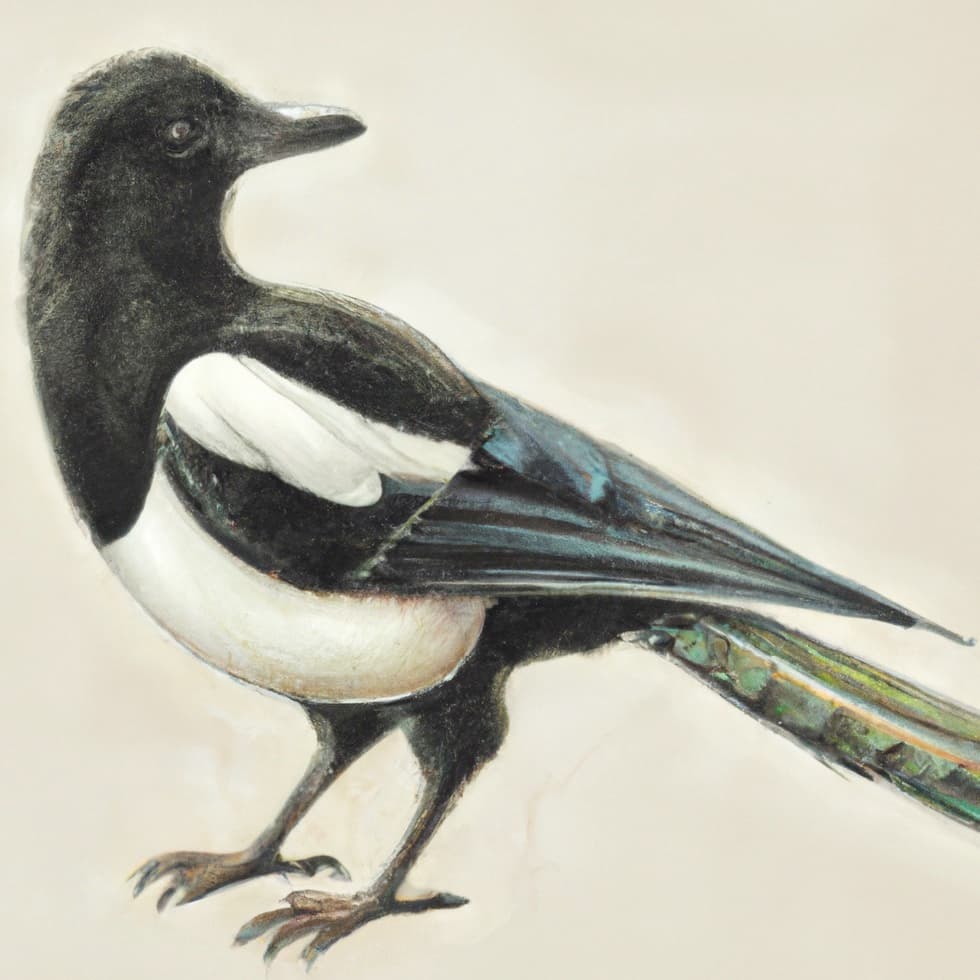
The Magpie is a highly intelligent bird with a striking appearance and fascinating social behaviour. With their distinctive black and white plumage and long tails, Magpies are a favourite of many birdwatchers and nature enthusiasts. In this blog, we’ll take a closer look at 27 curious facts about the Magpie and discover why this intelligent and resourceful bird is such a beloved member of the bird world.
27 Curious Facts about the Magpie
- The Magpie is a crow family member and native to Europe, Asia, and northwestern Africa.
- They are highly intelligent birds and are known for their problem-solving abilities and complex social behaviours.
- Magpies are omnivores and feed on a wide range of food, including insects, small mammals, fruits, and seeds.
- They have distinctive black and white plumage and long tail feathers.
- Magpies are known for their raucous and distinctive calls, which can be heard from a distance.
- The collective noun for a group of Magpies is a “tiding” or “tidings.”
- Magpies are highly territorial birds and will fiercely defend their nesting sites and feeding areas.
- They are able to recognise individual human faces and have been known to form long-term relationships with people who regularly feed them.
- Magpies are monogamous birds and will often mate for life.
- They are able to form long-term pair bonds and may remain with the same mate for multiple breeding seasons.
- Magpies are able to recognise their own reflection in a mirror, which is a sign of self-awareness.
- In some cultures, Magpies are considered to be a symbol of good luck and fortune.
- They are able to mimic the calls of other birds and animals and may use this ability to confuse and deceive potential predators.
- Magpies can recognise and remember the calls of individual family members and may use these calls to communicate over long distances.
- They are known for their elaborate and intricate nest-building behaviour, which involves using a wide range of materials, including twigs, grass, and mud.
- Magpies are vulnerable to predation by a wide range of animals, including larger birds of prey, snakes, and mammals.
- They are important insect predators and play a vital role in controlling insect populations in their habitat.
- Magpies are often found in urban areas and may feed on scraps of food in parks and gardens.
- They have a unique system of vocalisation that allows them to communicate with their mates and other members of their family.
- Magpies are able to recognise individual members of their family and will often return to the same areas to forage and roost.
- They are able to blend in with their surroundings and are often difficult to spot in the wild.
- Magpies have a relatively high reproductive rate, with some individuals producing up to 4-6 clutches of eggs per year.
- They are able to survive in a wide range of habitats, from urban areas to rural woodlands.
- Magpies are a key indicator species for the health of their habitat, and their presence is often used as a measure of ecosystem health.
- They are able to feed on a wide range of prey, including insects, small mammals, and other small invertebrates.
- Magpies are known to engage in elaborate courtship displays, which may involve the male bringing gifts to the female, such as food or nesting material.
- Magpies are a beloved species among birdwatchers and nature lovers, and their unique characteristics continue to inspire wonder and curiosity.
Where to Find the Magpie
Magpies are native to Europe, Asia, and northwestern Africa and can be found in a wide range of habitats, including woodlands, parks, gardens, and urban areas. They are often found in areas with a mix of open grassland and mature trees, which provides suitable foraging and nesting habitat.
Feeding the Magpie
Magpies are omnivorous and will feed on a wide range of food, including insects, small mammals, fruits, and seeds. Suppose you are interested in feeding Magpies in your local area. In that case, it is important to provide them with a suitable habitat that includes mature trees, open grassland, and ample food sources.
It is also important to avoid feeding them food that is harmful to their health, such as processed foods or bread. Magpies are also able to scavenge for food in urban areas and may be attracted to scraps of food in parks and gardens.
Final Thoughts
The Magpie is a fascinating and intelligent bird that has captured the attention and admiration of birdwatchers and nature enthusiasts for centuries. With their striking appearance, complex social behaviours, and problem-solving abilities, Magpies are a species that is sure to intrigue and captivate. Whether you are a seasoned birdwatcher or simply appreciate the natural world, the Magpie is a species that is worth seeking out. So why not take a moment to appreciate the beauty and wonder of these amazing birds and perhaps even provide them with suitable habitats in your local area? With their important contributions to the ecosystem and their unique characteristics, Magpies truly are a treasure of the bird world.